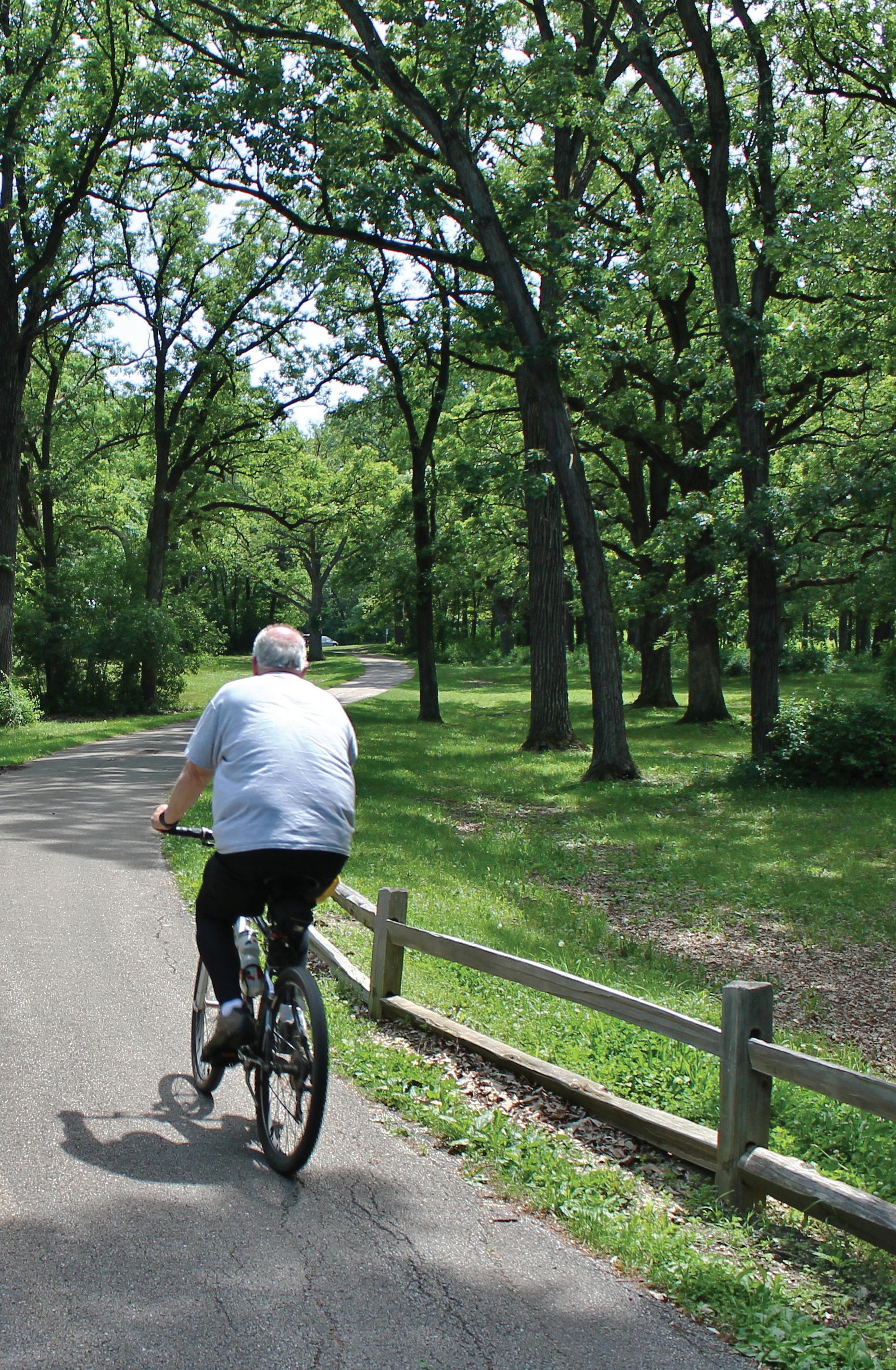Chicago

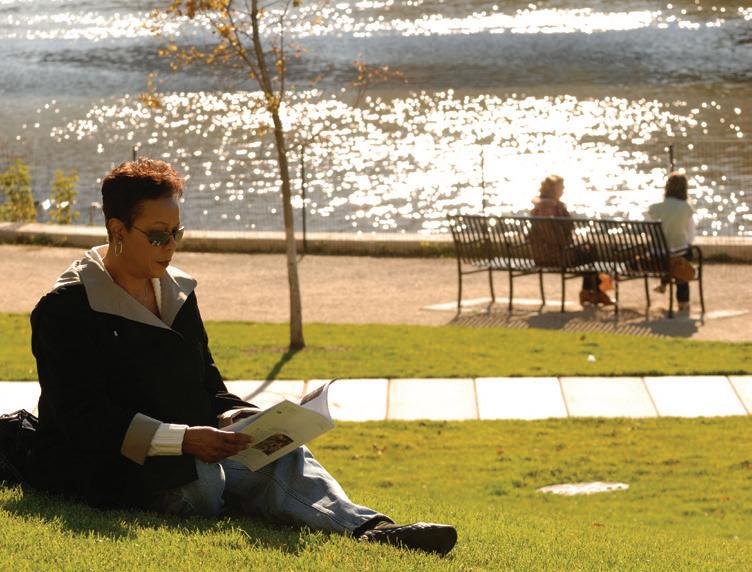


THERE IS SO MUCH TO BE PROUD OF IN 2022 AND MORE TO LOOK FORWARD TO IN THE YEAR AHEAD





THERE IS SO MUCH TO BE PROUD OF IN 2022 AND MORE TO LOOK FORWARD TO IN THE YEAR AHEAD
Trust for Public Land has long believed that everyone needs nature but we know that access to parks and public land is not equally shared. That is why, with your generous support, we are leading a nationwide movement to close this outdoor equity gap. Together, we are creating nature-rich places in the communities that need them most, improving people’s health, nurturing their joy, and strengthening their connection to the outdoors and one another.
As we head into our second half-century, we are more committed than ever to connecting everyone to the outdoors. We are focused on growing our impact and attracting new donors, friends, and advocates to our mission.
Thanks to your commitment to improving the quality of life for Chicagoans, we are advancing communitydriven initiatives in Chicago and investing in open space on the south and west sides to create long-term, systemic improvements for our neighborhoods.
Together we are helping to create a healthier, resilient, and more equitable city.
The impact of your giving is felt across the country— from transformed schoolyards in New York to extended greenways in Tennessee and beyond. Together, we are ensuring everyone can benefit from nature’s healing and unifying powers. Thank you again.
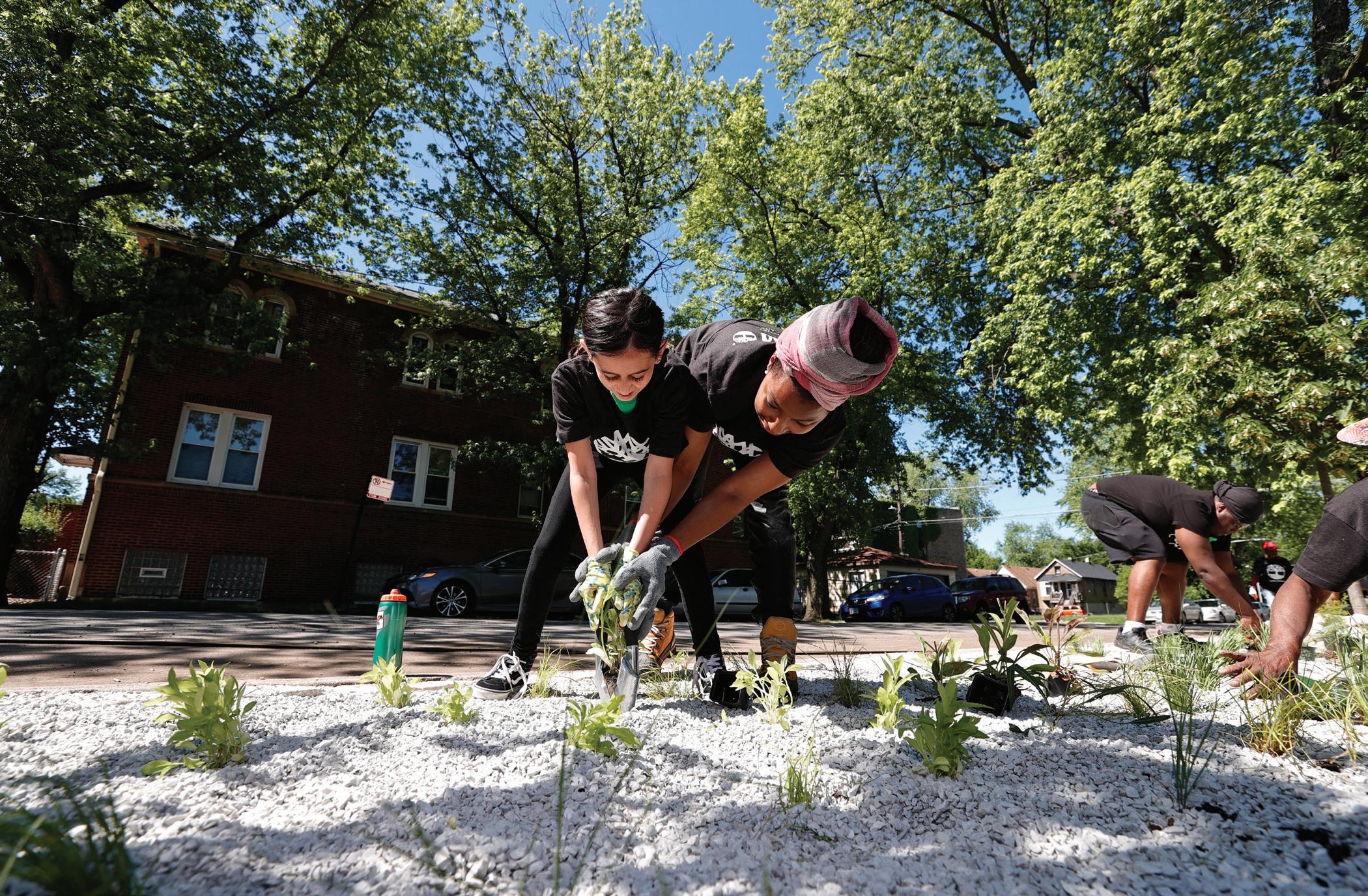 Kyle Barnett and Solomon Barnett, Co-Chairs, Chicago Advisory Board
Kyle Barnett and Solomon Barnett, Co-Chairs, Chicago Advisory Board
North Lawndale, a neighborhood on Chicago’s west side, has experienced both population loss and disinvestment that have left it with too much vacant land (the thirdhighest inventory in the city) and not enough safe and welcoming places where residents can enjoy the benefits of nature. TPL believes that parks and open space play a fundamental role in a community’s well-being, and that local leaders have numerous solutions for transforming vacant or underused properties into welcoming community assets. We put our broad array of tools and resources in the service of local leaders to bring their community vision for vibrant outdoor spaces to fruition.
One example is our partnership with the Friends of Sears Sunken Garden, the Foundation for Homan Square, and the North Lawndale Community Coordinating Council’s GROWSS (Greening, Open Space, Water, Soil, and Sustainability) Committee to restore the historic 1.7-acre green space that once served as an urban oasis for Sears employees and local residents. Through virtual and on-site collaborative design workshops, community members shared their ideas for
the reimagined garden, including types of plants, color schemes, and path designs for the garden that will once again serve as a healthful green space for the area’s 7,000 residents. With the support of TPL’s Equitable Communities Fund, we engaged a design team that includes internationally renowned garden designer Piet Oudolf.
TPL is also addressing the inequities in tree coverage in North Lawndale with the goal of doubling the neighborhood’s tree canopy over the next ten years . We are supporting the TREEmendous Lawndale initiative by using our decades of community engagement experience to create a public outreach campaign that includes education activities, public programming, and community tree planting days. Together with the Chicago Region Tree Initiative, the Morton Arboretum, several city agencies, and the GROWSS Committee, we will ensure the trees will be cared for and that the community will enjoy the many benefits that trees bring long into the future.
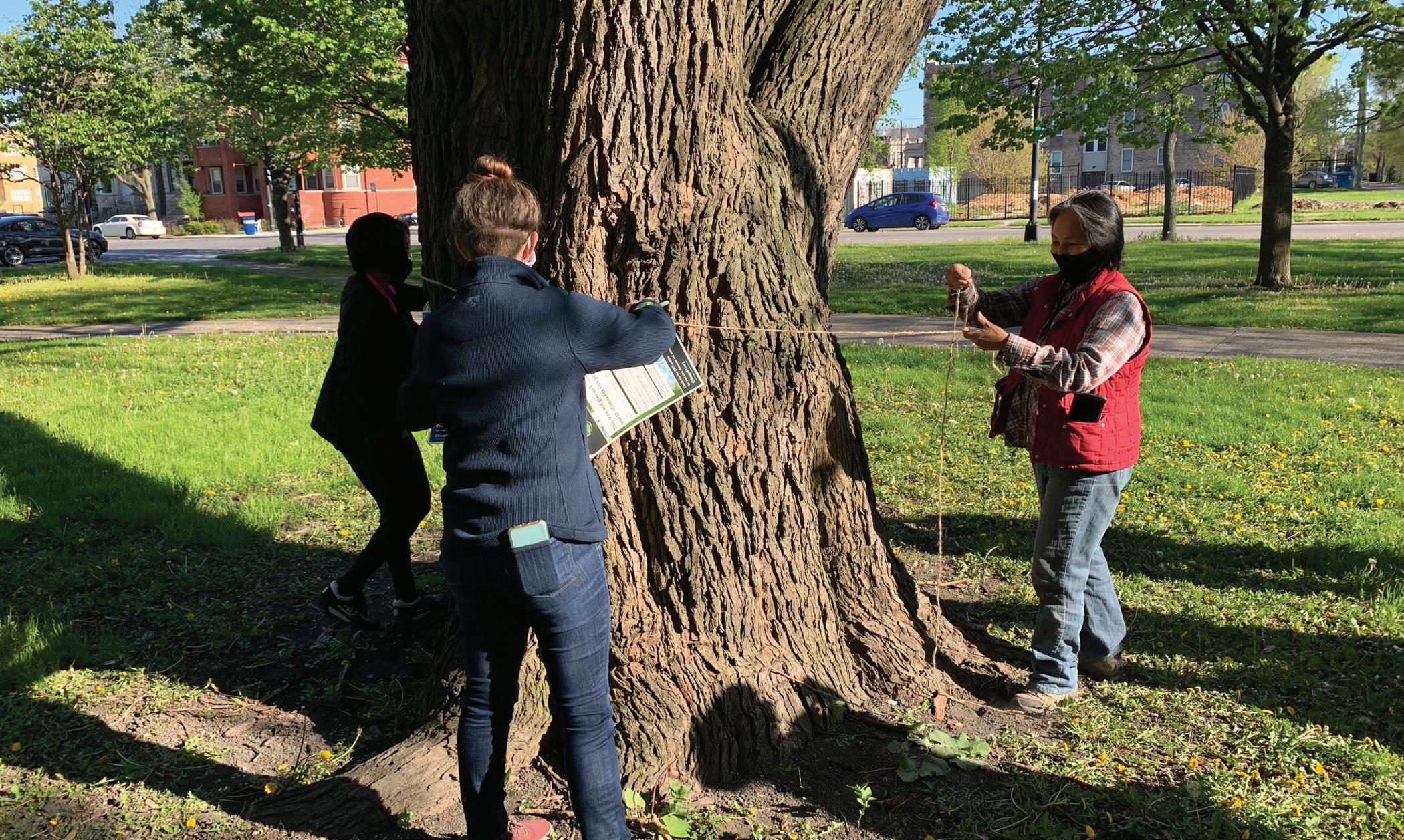
TPL stands for the celebration and recognition of Black lives—past, present, and future—who deserve to be named, respected, and remembered. Because of outdoor advocates like you, we have long helped preserve and create public access to outdoor spaces that tell the story of Black life in America.
TPL is partnering with Blacks in Green (BIG), an environmental justice organization focused on Chicago’s Woodlawn neighborhood. Thanks to BIG, Emmett Till’s childhood home was saved from demolition and granted landmark status by the Chicago City Council. Given there are over 95,000 sites on the National Register of Historic Places, but only 2 percent are dedicated to the experiences of Black Americans, the preservation of the Till home is critical to telling the full story of America.
We are working with BIG to complete the Emmett Till Campus , a series of gardens near the Till home that honors the luminaries of the Great Migration from Mississippi to Chicago and create a walkable village in the neighborhood. Through our Equitable Communities Fund, BIG received a grant to acquire two additional

parcels for the campus, and in 2022, TPL secured support from Timberland and L.L.Bean to advance work on one: the Mamie Till-Mobley Forgiveness Garden
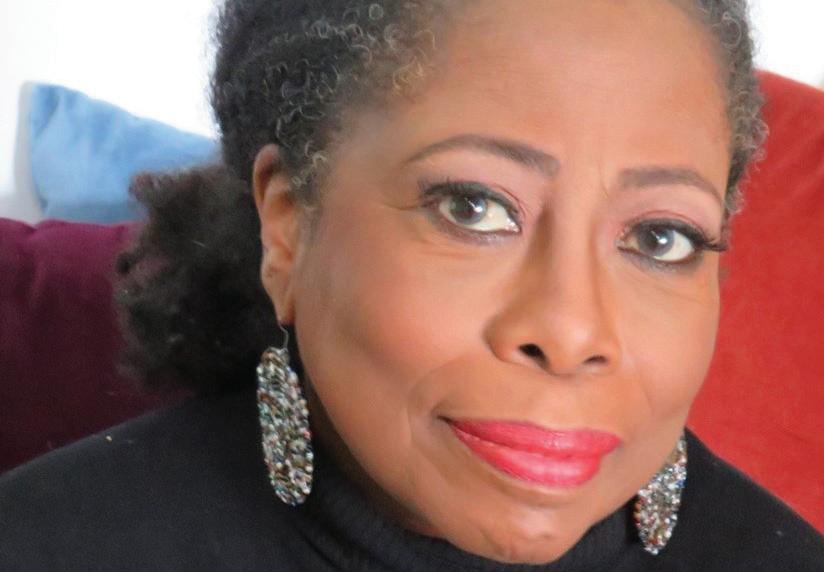
Emmett Till’s home holds special meaning for Naomi Davis, Founder and CEO of BIG. She was born the day after he was slain and her family home is just 13 miles from the murder site. Davis hopes the home and surrounding green spaces will deepen the community’s connection to him, celebrate families like his who were part of the Great Migration, and foster a sense of pride and optimism in the Black community.
“We want people to understand Emmett beyond just his brutalization.” She says, “The Great Migration is one of the most underreported stories of our time. Seven million people voted with their feet and left the south in search of a new life in the north.” Davis hopes the stories of those remarkable, triumphant people will inspire current and future generations. “We want to celebrate the genius, the creativity, work ethic, and love of our people.”
We are working with community members to transform a well-used but poorly maintained basketball court into a colorful, welcoming outdoor place for all. WACA Bell Park sits in a high-traffic location within North Lawndale near the Ogden commercial corridor.

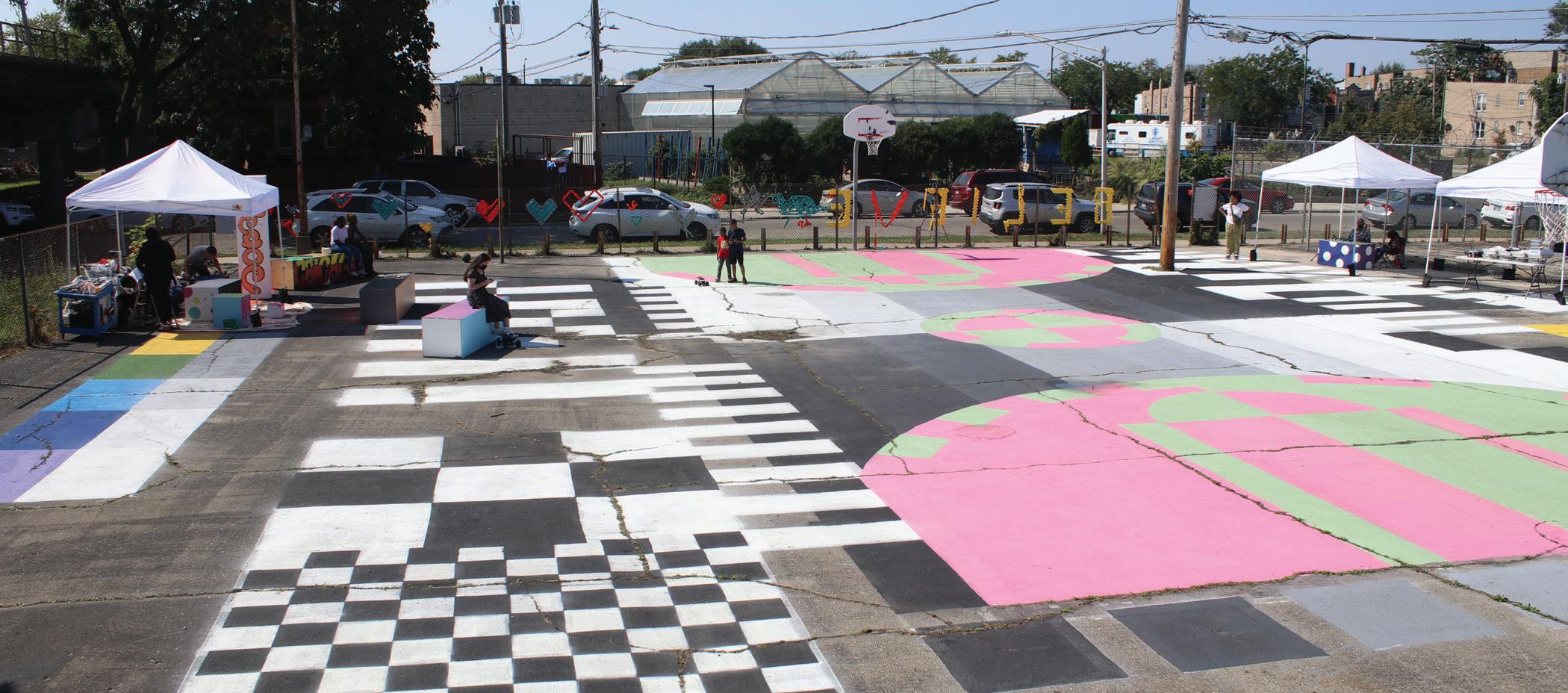
Last year, TPL worked with local youth and designers to develop a set of renderings that reflect community aspirations for the space such as repositioning the court, building a performance stage, and installing new landscaping, permeable surfaces, and seating areas. With funding from TPL’s Equitable Communities Fund, TPL hired landscape architects site design group, ltd. to create a master plan that led to a $500,000 grant from the City of Chicago to begin the transformation.
Through the Chicago Infrastructure Reuse Network, TPL continues to convene local leaders to share resources and best practices for repurposing existing infrastructure and creating new green spaces. The Network not only provides a forum of support for community leaders seeking to implement trails and other infrastructure reuse projects in their community, but also serves as a liaison to city officials. Current members, like Friends of Big Marsh and the Calumet Collaborative, represent high profile projects such as: Under the Grid, Englewood Nature Trail, Bronzeville Trail, Major Taylor Trail, and El Paseo Community Garden. As a testament to the group’s growing influence, the city vetted its new trails plan with the Network before making it public.
Conserving land and creating parks offers key opportunities to mitigate climate change by absorbing flood waters, combating extreme heat, and sequestering carbon in soil and in vegetation. These nature-based solutions are not only essential strategies for the climate crisis; they also deliver many collateral benefits for health, equity, community, jobs, and economic development.
TPL is partnering with Friends of the Chicago River and the Chicago-Calumet River Watershed Council to build the Targeted Watershed Natural Solutions Tool . This interactive mapping platform will reveal locations where conservation efforts can have the most impact in the Chicago-Calumet River Watershed. In early 2022, we interviewed representatives from 30 stakeholder organizations to understand how the tool could most effectively achieve local conservation goals. In April 2022, we began building the tool with help from a technical advisory team of more than 35 environmental leaders who provided guidance and data resources.
Slated for completion in early 2023, the tool will be available for free on a public-facing website for individuals, conservation groups, and public agencies seeking data to plan and advocate for conservation.
TPL is also a leading member of the campaign committee advocating for the passage of a November
2022 Cook County ballot measure that would generate $1 billion in funding for the Forest Preserves of Cook County over the next 25 years. More than 150 organizations have joined our coalition in support of the measure.
In 2022 TPL launched the Land and People Lab, which uses evidence to increase the impact of our on-theground work and spark a national movement for parks and public land. The Lab informs policies and practices, builds partnerships, and shares resources to expand the many benefits of nature and the outdoors. Locally, the Lab provides tools like:
• Targeted Watershed Natural Solutions Tool , which will provide a free online interactive mapping resource for public and private agencies that reveals locations where conservation efforts can have the most impact.
• ParkScore® Index , the national gold-standard comparison of park systems across the 100 largest cities in the U.S. These ratings have helped cities like Chicago advocate for park equity.
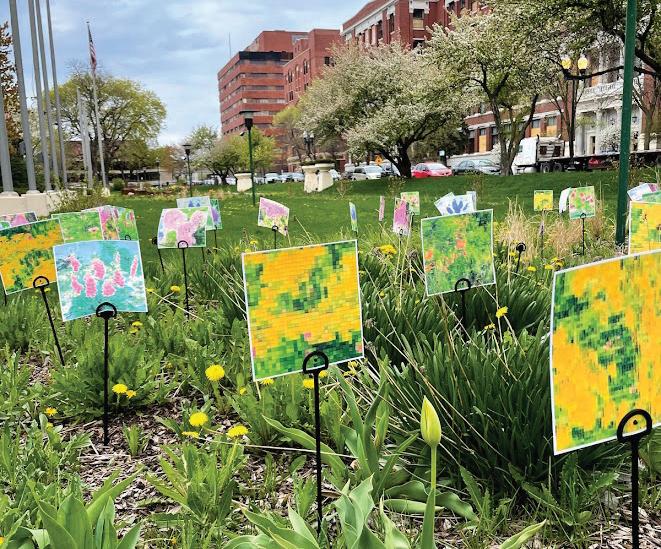
• ParkServe®, enabling anyone, anywhere to locate their existing parks, and advocate for new parks based on local community, health, climate and equity needs.
Sears Sunken Garden: $500,000 to continue community engagement activities and ensure the long-term stewardship and maintenance of the garden.
WACA Court/Bell Park: $500,000 to create a vibrant community gathering space by adding landscaping and green infrastructure elements.
Chicago Trails and Greenways: $100,000 to ensure the Chicago Infrastructure Reuse Network can continue to meet and help each other plan more rails-to-trails projects.
and invited TPL to become one of its 16 members. The Council takes a regional approach to managing stormwater and sewage pollution and has a shared vision of a blue-green corridor of connected natural open space. TPL is leading the Council’s first project— the Targeted Watershed Natural Solutions Tool—an interactive mapping platform which will allow users to pinpoint locations where conservation efforts can deliver multiple benefits, such as protecting areas against flooding, reducing air pollution, restoring critical wildlife habitat, and reducing the urban heat island effect. We talked to Margaret about FOCR’s collaboration with nonprofit advisors including TPL and the importance of access to the outdoors.
Why is collaboration among local agencies and nonprofits important for the success of the ChicagoCalumet River Watershed Council?
“Collaborating in this way breaks down barriers between jurisdictions allowing for more cross-boundary work to occur and will have a bigger impact than if we all worked independently.”
How does TPL contribute to the Watershed Council’s mission?
The Chicago River has a friend in Margaret Frisbie. For 17 years she has served as executive director of Friends of the Chicago River (FOCR), the only organization solely dedicated to protecting the 156-mile Chicago River system. FOCR works to improve water quality standards and advocates for responsible commercial and residential development along the river corridor. Over its 43-year history, FOCR has brought life back to the once neglected, polluted river; 85 percent of the sewage is gone, and nearly 70 species of fish, countless bird species, and wildlife like beavers, turtles, and river otters call the river home again.

Margaret knows that collaborating with other organizations helps FOCR achieve its goals and ensures the long-term stewardship of the river system. FOCR created the Chicago-Calumet River Watershed Council
“TPL is a terrific partner. The staff are creative, innovative, and collaborative. They are fully engaged in the process and come to it with open minds and a willingness to share their expertise, experience, and resources. Most importantly, they truly celebrate the diversity of all the organizations in the Watershed Council.”
Why is equitable access to nature important?
“Having access to nature allows people to find peace and contemplate life. There is so much evidence that it improves our psychological and physical health. And hopefully interactions with nature will make people curious about their role in sustainability, in how to protect waterways, green spaces, and wildlife for future generations. We are all connected to the planet. We all have a real responsibility to make it better.”
